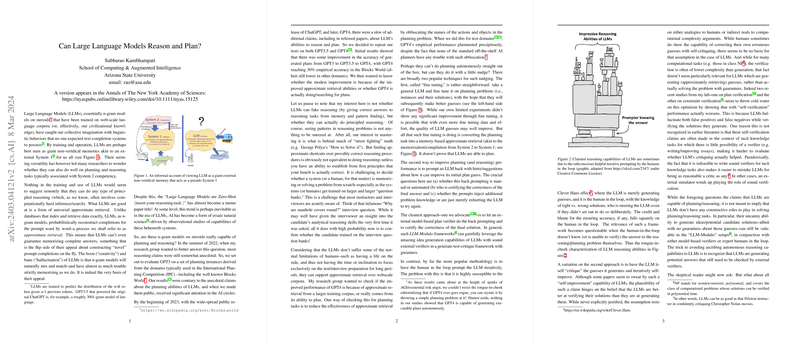Evaluating the Planning and Reasoning Capabilities of LLMs
Introduction to the Study
LLMs have demonstrated remarkable linguistic behaviors, raising questions about their abilities beyond simple text completion, particularly in relation to tasks traditionally associated with human-like reasoning and planning capabilities. This article explores the inherent capabilities of LLMs, scrutinizing whether they can authentically perform planning and reasoning, or if their apparent successes in these domains are merely a result of other underlying mechanisms.
Core Findings and Methodology
The paper began with an analysis of GPT3's performance on a variety of planning instances derived from the International Planning Competition (IPC), including the Blocks World domain. The outcomes contradicted popular narratives about LLMs' planning abilities, showing considerable limitations. This assessment was extended to more advanced models, GPT3.5 and GPT4, noting some improvements across iterations but still lacking in substantive planning capability.
- GPT4 demonstrated a 30% empirical accuracy in the Blocks World domain, higher than its predecessors but still significantly lower in other tested domains.
- When attempting to isolate genuine planning from approximate retrieval by obfuscating action and object names in planning problems, GPT4's performance significantly decreased.
These observations provided strong evidence against LLMs' inherent ability to autonomously generate executable plans.
Approaches and Techniques for Enhancing LLM Planning Capabilities
The paper explores two main strategies to potentially augment LLMs' planning and reasoning performances: fine-tuning and iterative prompting.
- Fine-tuning: While initially hopeful, the process did not showcase a noticeable improvement in LLMs' planning capabilities. This technique essentially converts planning tasks into a form of memory-based approximate retrieval, rather than instilling genuine planning competence.
- Iterative prompting: This includes back-prompting LLMs with hints or suggestions to improve initial plan guesses. The paper emphasizes relying on external model-based plan verifiers or expert humans in a loop to authenticate the correctness of LLM-produced solutions, underlining the framework termed as "LLM-Modulo."
Discussion on Autonomy in LLMs
The paper critically addresses the distinction between LLMs' generation of correct answers through pattern recognition and their true ability to engage in principled reasoning. It identifies major challenges in discerning memorization from genuine problem-solving, both in LLMs and humans, particularly when entities are trained on extensive corpuses or "question banks."
Highlighting the limitations of self-verification strategies, the paper argues that LLMs' "self-improvement" claims rely on flawed premises, largely due to their tendency to produce both false positives and negatives without the intervention of reliable external verification mechanisms.
Implications and Future Directions
The research provides a nuanced understanding of LLMs' capabilities and limitations, suggesting that while they fall short of performing autonomous planning and reasoning, their strengths in idea generation and approximate retrieval can be effectively utilized. It proposes leveraging LLMs in conjunction with external verifiers or human expertise within the "LLM-Modulo" framework, advocating for a balanced approach that harnesses the generative strengths of LLMs while mitigating their reasoning shortfalls.
This perspective not only challenges current assertions about LLMs' capabilities in planning and reasoning tasks but also sets a constructive path forward, emphasizing collaboration between LLMs' generative capacities and human expertise or robust verification systems, to truly advance the field of AI.
Conclusion
The paper concludes that, despite improvements across iterations from GPT3 to GPT4, there remains no compelling evidence to suggest that LLMs possess an inherent capability for autonomous reasoning or planning. Their primary function as universal approximate retrieval systems, however, opens up exciting avenues for supplementing human cognitive tasks, provided their limitations are thoroughly understood and accounted for. It calls for a tempered approach in evaluating LLMs' advances, advocating for strategies that pragmatically leverage their strengths while transparently addressing their deficiencies.
